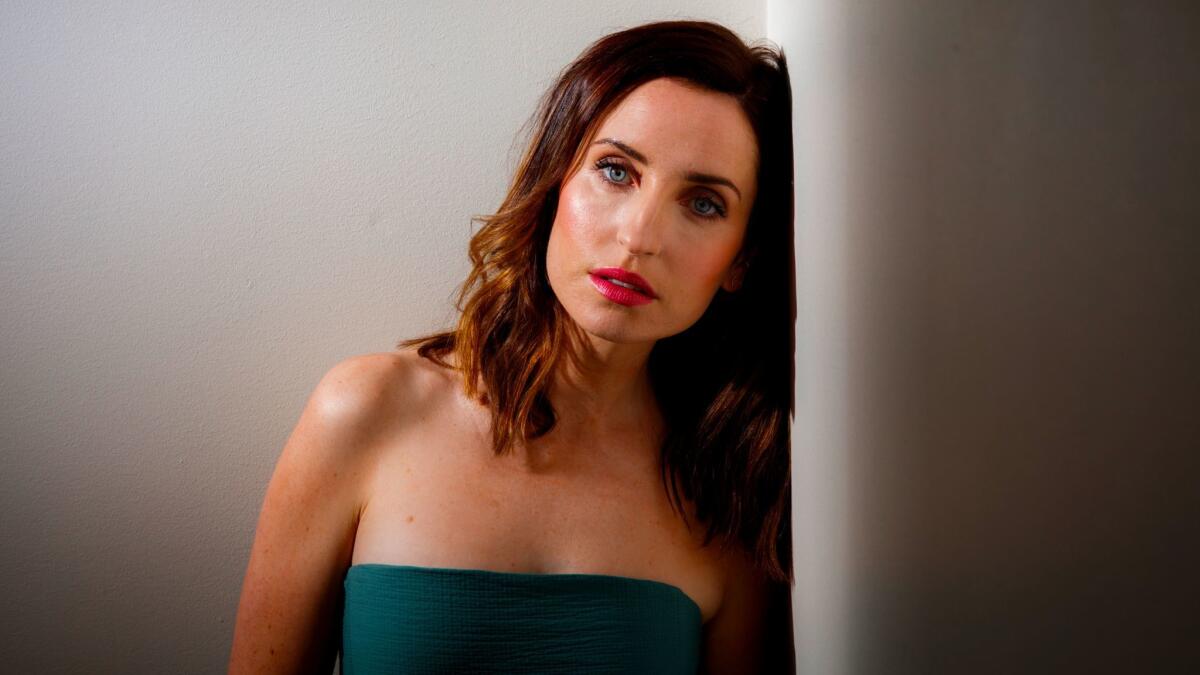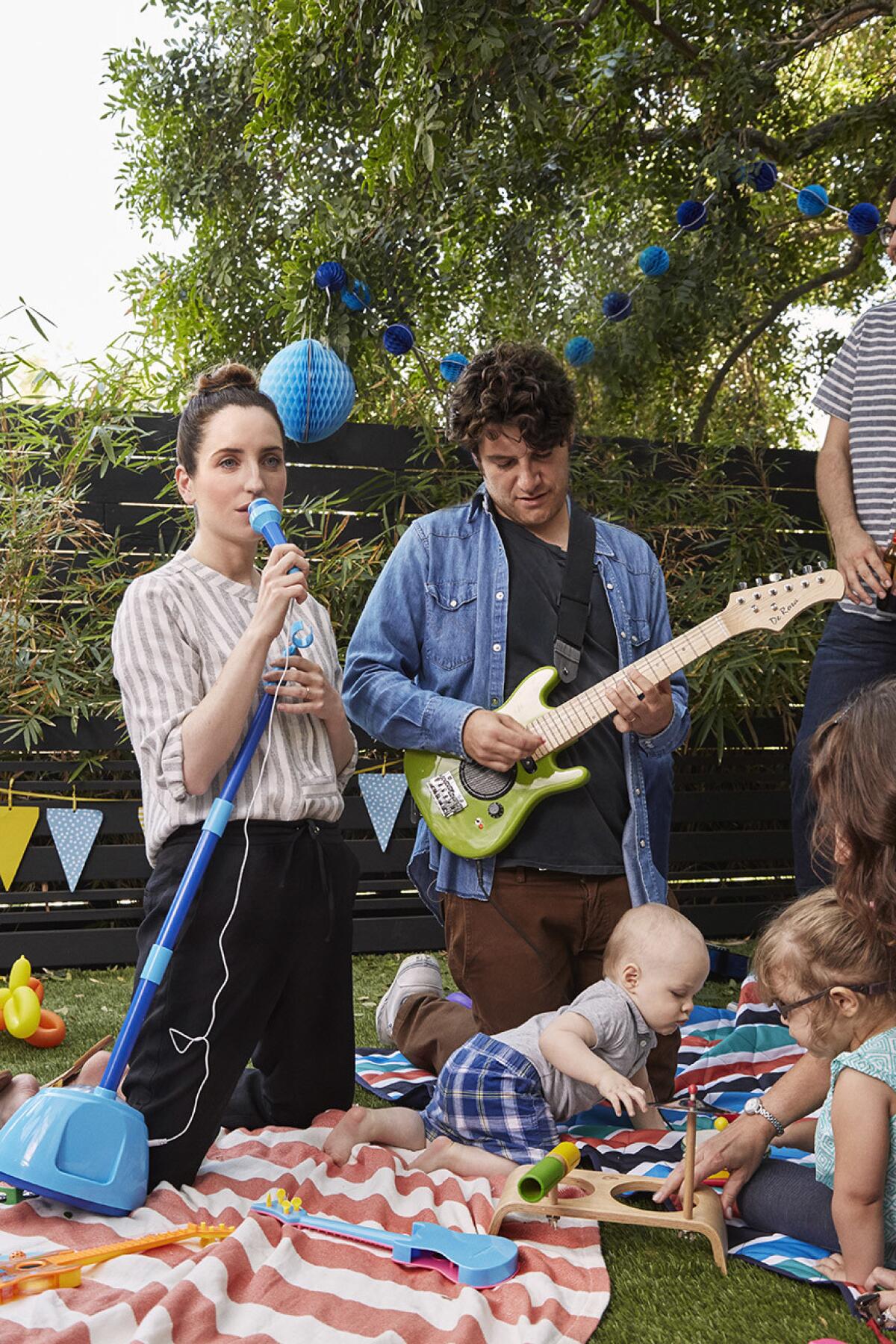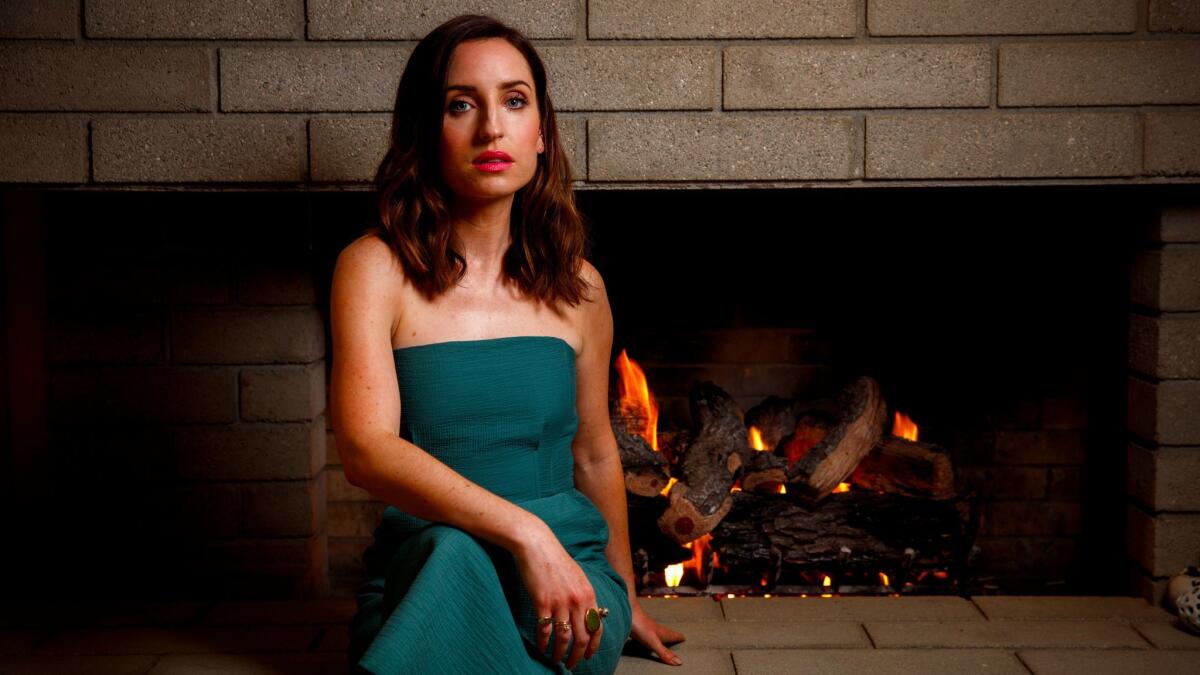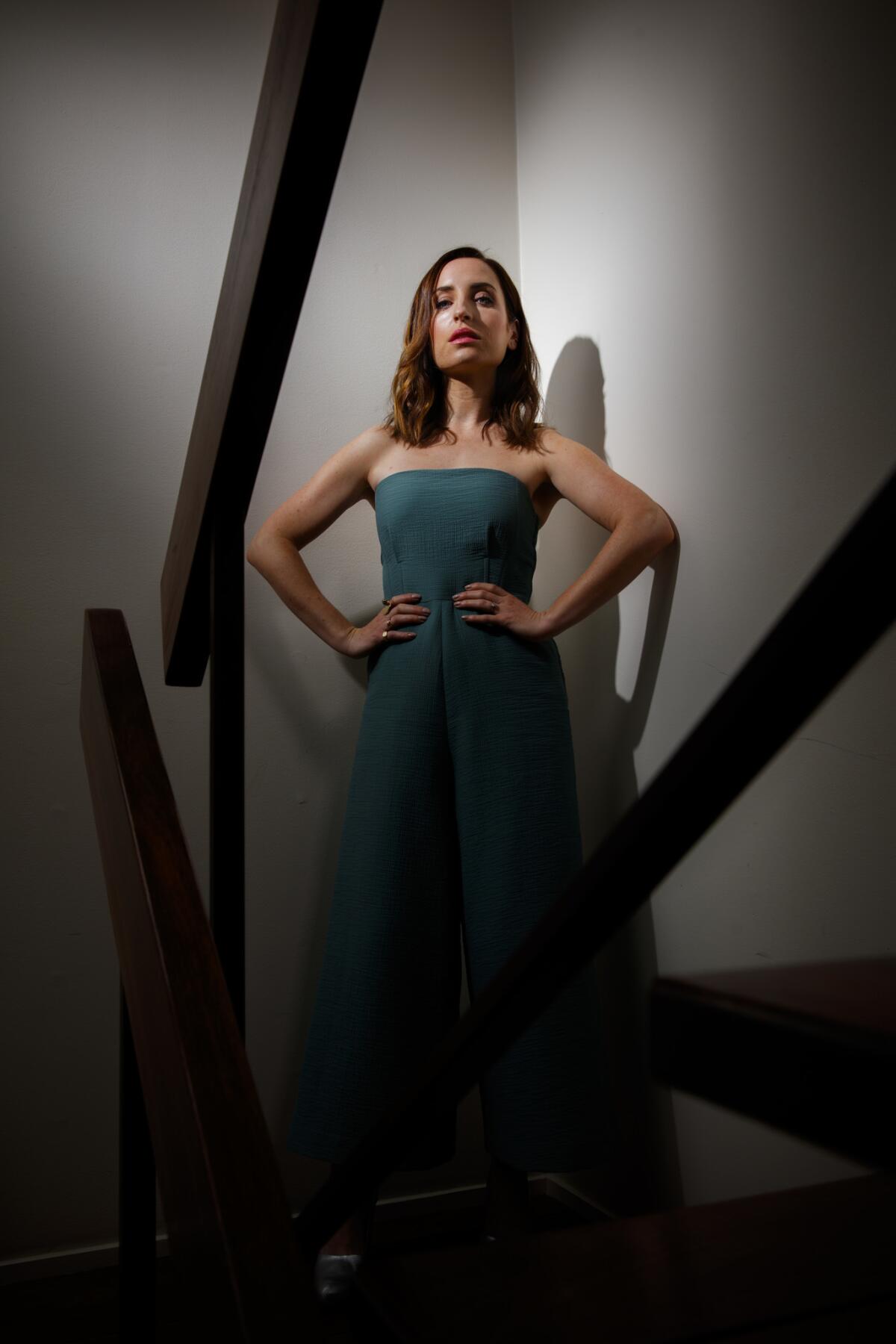Zoe Lister-Jones made ‘Band Aid’ with an all-female crew. Your move, Hollywood

- Share via
Zoe Lister-Jones is 34 years old and has been married for four years. Which means that when she’s at a party, basically every conversation starts with the same question: “When are you going to have kids?”
“We’re getting there,” she’ll answer, smiling politely. But being childless and in her 30s sometimes makes her feel like a pariah. A few weeks ago, she went to a kid’s birthday party, and she was one of only two women there without offspring.
“It’s hard, because there’s a part of me that feels like because I can’t relate to their stage in life, that I’m not bringing something to the table,” she says. “I’m such a workhorse that I’ve always prioritized my work, and as a woman, that’s a really different thing.”
This is the very conundrum at the heart of Lister-Jones’ new movie, her directorial debut “Band Aid.” The film — which she also stars in and wrote — is about a couple trying to move past the devastation of a miscarriage just as their friends are starting families. But there’s so much unspoken pain between the husband and wife that they begin to fight constantly. So in an effort to curb the bickering, they start a garage band called “The Dirty Dishes” and use the lyrics to vent their marital frustrations.

Review: Director-star Zoe Lister-Jones shines in the poignant dramedy 'Band Aid' »
Lister-Jones hasn’t said just how much of the film comes from personal experience, which is unusual for her because nearly every script she’s written thus far has been autobiographical. Her first feature screenplay, 2010’s “Breaking Upwards,” was about the yearlong period when she and her husband, fellow actor and filmmaker Daryl Wein, decided to have an open relationship. The real-life couple co-starred in the film, in which their characters’ names were Daryl and Zoe.
“Band Aid” is the first movie Lister-Jones has made without her spouse, whom she met when they were both students at NYU’s Tisch School of the Arts 13 years ago. Wein did serve as an executive producer on the movie, but was barely ever on set. Many of the fights in their own marriage, Lister-Jones says, were beginning to stem from the lack of separation between work and home life.
“There was no place that the work ended and our life began,” she explains, as Wein makes himself dinner in their kitchen, just out of earshot. “I think this has been a nice respite for both of us. We can give each other notes and watch cuts, but it’s not all-consuming in our daily lives together.”
Since decamping from Brooklyn’s Fort Greene a few years ago, the couple have been living in a Studio City post-and-beam that’s ripe for a home design magazine tour. Lister-Jones has multiple pairs of custom No.6 clogs by the door. The books in the built-in shelves are organized by color. White sheepskin throws abound. There’s even tumbleweed the couple picked up in the desert during a trip to Joshua Tree that now serves as a piece of avant-garde art.
Their Instagram accounts project an even more enviable lifestyle. In April, they embarked on a road trip across the Southwest, shacking up in rustic ranch cabins and skydiving over the Moab Desert. Wein took numerous photos of his wife wearing oversized hats and bandanas, the majestic Red Rocks rising behind her.
There are no pictures of dirty dishes. But that doesn’t mean they don’t still stack up in the sink sometimes.
“Now we’re able to share those duties, but we’re 13 years in,” she says, curling under a blanket on the couch. “I think it does take time for men and women to learn how to share a space, and a lot of that comes from social condition and patriarchal values that are intrinsic in the way we’re raised. A lot of boys are raised with their mom doing their laundry and dishes and getting away with a lot more than little girls can.”

Growing up in New York, Lister-Jones was raised a staunch feminist. In the fourth grade, she had a school assignment to create her own business. She decided to form an all-female construction company: Big Women Construction.
“I think it’s been this thing that has always been cellular in me,” she says, “that I wanted to create art or something in a collective of women.”
So when it came time to put together the crew for “Band Aid,” Lister-Jones decided she wanted to work alongside a group of women. But she knew it would be a challenge to pull together a female production team with enough experience to make “department heads comfortable on a movie of this scale.”
“Which is a total Catch-22,” she adds. “But I wanted to confront that head-on and take risks with some crew members who maybe had less experience, because otherwise, how are these women going to get the experience to begin with?”
“There was a part of me that was interested in subverting a paradigm in order to challenge a system that is really broken,” she continues. “Even though there’s been a lot of dialogue around the underrepresentation of women crews, the numbers aren’t changing. In fact, they’re getting worse. I just felt like since I was in a position to do so, it was kind of my duty to.”
Special Report: Can moviegoing be saved? »
Alongside producer Natalia Anderson — whom Lister-Jones met at work on the set of “Life in Pieces,” the CBS family drama she’s been on for two seasons — the filmmaker set out to hire roughly 40 women. It was part of the pitch package she presented to financiers who were considering putting up the film’s budget, a sum Lister-Jones said was less than $5 million.
“It was definitely challenging,” Anderson agrees. “But between the two of us, we used all the production resources at our fingertips — posting on job boards for women in film and taking advantage of every relationship we had. But Zoe was never crazed. She handled it with such grace and focus.”
As a result, the vibe on-set was so “calm and quiet and efficient,” Lister-Jones said, that the few male actors kept saying how wonderful they felt surrounded by women. Adam Pally, who plays the actress’ husband in the film, even felt more comfortable getting naked during the sex scenes because he “felt less judged.”
“Yeah, I loved this. Men are terrible. We’re the worst,” Pally said, only partially kidding. “I’ve been telling people since I did this movie that now, all men sound like animated germs in flu commercials to me.”

Since the work was acquired by IFC Films after its debut at the Sundance Film Festival in January, Lister-Jones has been asked to take an increasing number of Hollywood meetings. She’s noticed that there seems to be “more of a mandate” to hire female directors within the studio system, which she finds encouraging. But everyone keeps asking what she’s going to do next. Fortunately, she’s “very much a ‘what’s next’ person,” and is already planning to direct another one of her scripts — one she hasn’t even written yet — next March when she’s on hiatus from “Life in Pieces.”
The idea of actually taking a hiatus during her hiatus, however, scares her. Growing up, her mother was a video artist and her father was a conceptual photographer — and both had teaching gigs on the side. “So I always thought it was an impossibility to make a livelihood from your art,” she says. “That’s such a trigger from my childhood.”
In fact, when she was accepted into the conservatory acting program at Tisch, she was reluctant to take the spot because she “was always apprehensive about putting all of [her] eggs in one basket.” Which explains, somewhat, why she is continually trying on new hats: Actress, writer, director and, in “Band Aid,” musician.
“When you’re at a certain stage in your career,” she says, “it’s hard to not feel like, ‘I hit this benchmark but there’s this other benchmark in the distance and now I have to hit that one.’ When do you decide it’s OK to maybe live in this moment rather than anticipating the next?”
She pauses, shaking her head at her own question.
“I don’t.”
Follow me on Twitter @AmyKinLA
ALSO
It took Robin Swicord 10 years to get a directing job after 'The Jane Austen Book Club.' Why?
Teens at the multiplex: Why some of the young are returning to theaters
Meet the 'grandma Nancy Drews' behind 'The Keepers,' Netflix's newest true-crime series
Only good movies
Get the Indie Focus newsletter, Mark Olsen's weekly guide to the world of cinema.
You may occasionally receive promotional content from the Los Angeles Times.








